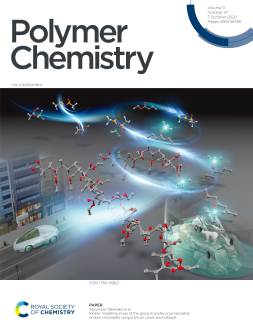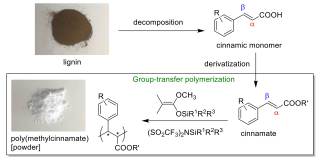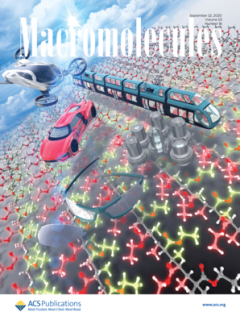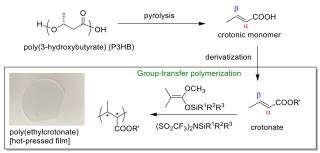Nippon Shokubai and RIKEN Developed the Efficient Polymerization System for Biomass-derived Hardly Polymerizable Monomers
NIPPON SHOKUBAI CO., Ltd. (Headquarters: Osaka City, Japan, President: Yujiro Goto, hereinafter “Nippon Shokubai”) and RIKEN CSRS bioplastic research team (Team Leader: Hideki Abe, Research Scientist: Yasumasa Takenaka, hereinafter “RIKEN”) have succeeded in developing an efficient polymerization system and high-performance polymers for hardly polymerizable monomers, derived from biomass resources.
Various aliphatic and aromatic compounds, which have an unsaturated C=C bond, can be obtained from biomass resources. For example, cinnamic monomers are included in lignin derivatives, which are results from the decomposition of lignin, non-edible biomass. Crotonic monomers can be obtained from pyrolysis products of bio-synthesized 3-hydroxybutyrate (3HB) and poly(3-hydroxybutyrate) (P3HB). These monomers are classified in β-substituted acrylates, acrylic compounds possessing a substituent at the β-position of the α,β-unsaturated carbonyl group. Addition-polymerization of β-substituted acrylates affords a ditactic polymer, since the backbone of the polymer main chain possesses two asymmetric carbons for every monomer unit. Therefore, a high stereo-control of such a polymer leads to the creation of biomass-derived and high-performance polymeric materials.
However, β-substituted acrylates are known as a hardly polymerizable monomer for its difficulty to polymerize by traditional radical polymerization methods, because of the steric hindrance and/or the electrical factor from the substituent located at the β-position. In addition, limited polymerization examples have issues for an industrial production, such as a requirement of harsh polymerization conditions. Nippon Shokubai and RIKEN demonstrated that organo-catalyzed group-transfer polymerization (GTP) system is applicable for the efficient polymerization of β-substituted acrylates, which system is characteristic of achieving an efficient polymerization by activating monomer. We elucidated the polymerization mechanism and identified the factor which hinders an efficient polymerization. Furthermore, we succeeded the development of the polymerization method that enables high molecular weight polymers efficiently under a mild condition, by optimizing the substitution structures of organo-catalysts and initiators.
Cinnamic polymers have high heat resistance comparable to that of poly(carbonate), known as one of the engineering plastics, and show chemical resistance for various solvents. In addition, these polymers are expected to be applied to high-strength materials. On the other hand, crotonic polymers possess good transparency comparable to that of poly(methylmethacrylate) (PMMA) and also exhibit higher heat resistance and chemical resistance as compared to those of methacrylate polymers. These characters are considered to be due to the liquid crystallinity which is appeared by a highly controlled stereoregularity.
Nippon Shokubai and RIKEN are now proceeding the establishment of the process technology and the application development of the polymers.
These research results have been published in Polymer Chemistry (Royal Society of Chemistry) 2020, Vol. 11, Issue 37, Pages 5981-5991 (Front Cover) DOI: 10.1039/d0py00353k, and Macromolecules (American Chemical Society) 2020, Vol. 53, Issue 18, Pages 7759-7766 (Supplementary Cover) DOI: 10.1021/acs.macromol.0c01122.
Related Articles:
Communications Chemistry 2019, 2, 109. (DOI: 10/1038/s42004-019-0215-3)
Macromolecules 2019, 52, 4052. (DOI: 10.1021/acs.macromol.9b00272)
Link:
Acrylic resin from lignin derivatives (RIKEN Press Release, October 17,2019)
http://www.csrs.riken.jp/en/press/press191017.html
About NIPPON SHOKUBAI Co., Ltd.: Since 1941, Nippon Shokubai has grown up its business with unique catalyst technology. Nippon Shokubai has supplied, for example, ethylene oxide, acrylic acid, automobile catalysts, process catalysts and so on. Among all, our global market share of superabsorbent polymer is the largest in the world now. Nippon Shokubai is a global chemical company operating under its corporate mission “TechnoAmenity-Providing affluence and comfort to people and society with our unique technology.” https://www.shokubai.co.jp/en/
【Contacts】
Investor & Public Relations Dept.,
NIPPON SHOKUBAI CO., LTD.
TEL: +81-3-3506-7605 E-mail: shokubai@n.shokubai.co.jp
RIKEN International Affairs Division
E-mail: pr@riken.jp




[Files]